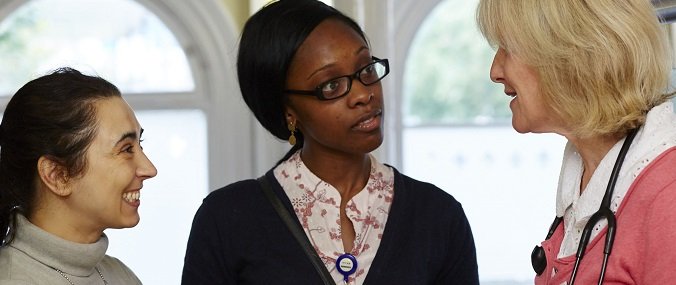What are the health impacts of climate change?
Human health is inextricably linked to planetary health. Much of what contributes to climate change also contributes to ill health and health inequalities, such as air pollution from the combustion of fossil fuels. This is why RCGP have a strategic priority to respond to the climate emergency.
More frequent and intense heatwaves, flooding and storms all pose a threat to our health and wellbeing, including heat-related illness, stress and injury, particularly to those that are more vulnerable. Climate change is also facilitating the increase of diseases, like Lyme Disease.
1. Supporting GPs and practices to improve their sustainability and reduce emissions
GPs are well placed to advocate for climate change mitigation and adaptation. Much of what we already think of as good practice are clear examples of sustainable healthcare. Examples include championing wellness through preventative measures which reduce the incidence or progression of ill health, alongside reducing over-prescribing.
Primary care currently accounts for approximately 23% of NHS England’s emissions footprint or 0.9% of the UK’s total emissions (Lancet journal). The majority of primary care emissions are associated with prescribing. These are predominantly through the emissions related to the manufacturing of pharmaceuticals and chemicals and emissions from anaesthetic gases and metred dose inhalers.
The College has a number of new and ongoing pieces of work to support practices in the actions they can take to reduce emissions and move towards more sustainable primary care.
2. Lobbying governments and decision-makers to deliver change
The RCGP is a founding member of the UK Health Alliance for Climate Change (UKHACC), which works to raise awareness, empower people and influence change related to the links between health and climate change. We're also proud to have supported and contributed to many recent advocacy actions.
3. Taking action at the RCGP
RCGP is committed to taking action on climate change as a property owner, landlord, employer and purchaser. RCGP has a dedicated Sustainability Lead, but every directorate is embedding action on climate change to reduce emissions and build resilience.
The College has been delivering multiple actions to reduce emissions:
- Establishment of Climate and Sustainability Faculty Leads
- Establishment of a delivery group across the College
- Development of a Heat Decarbonisation Plan for 30 Euston Square
- Creation of a framework for embedding sustainability within the delivery of events/conferences
- Coverage of planetary health within every component of the MRCGP assessment
- Contribution to the Lancet Review UK policy briefing (external PDF)
Our planned pipeline of activity includes:
- Embedding sustainability guidelines within procurement
- Enhancing the Net Zero Hub
- Exploring the decarbonisation of our financial holdings and relationships, including in relation to banking
- Producing an action plan for increasing the number of events/meetings which provide a healthy, majority plant-based offering
Climate and Health Scorecards
For actions taking place in 2022-23 the RCGP scored joint first in the Climate and Health Scorecard Initiative.
The scorecards recognise the significant progress that the College has made, ranging from reducing emissions within internal operations, educating staff and members about planetary health, and the wider advocacy and policy work.
Find out more about the RCGP's Climate and Health Scorecard.
RCGP’s carbon emissions
We conduct Streamlined Energy and Carbon Reporting (SECR) annually, on a voluntary basis, to be transparent about the College’s carbon emissions and to facilitate our pipeline of action on reducing carbon emissions. Our carbon emissions have been measured since the baseline year 2019-20.
During the reporting year of 2023-24, RCGP saw a reduction in total Scope 1, 2, and 3 market-based emissions. Specifically, emissions decreased by 23% compared to the previous year (2022-23). When compared to the baseline year of 2019-20, this marks an overall reduction of 46%.
Thank you for your feedback. Your response will help improve this page.




